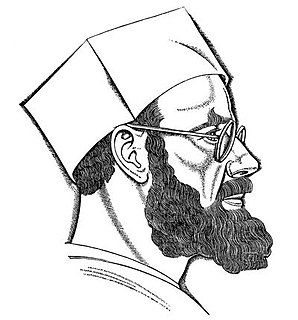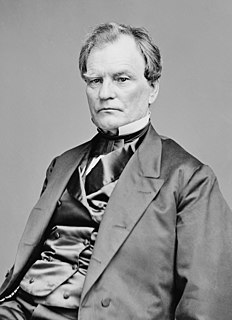A Quote by Eric Gill
That state is a state of slavery in which a man does what he likes to do in his spare time and in his working time that which is required of him.
Related Quotes
It requires twenty years for a man to rise from the vegetable state in which he is within his mother's womb, and from the pure animal state which is the lot of his early childhood, to the state when the maturity of reason begins to appear. It has required thirty centuries to learn a little about his structure. It would need eternity to learn something about his soul. It takes an instant to kill him.
The only distinction between freedom and slavery consists in this: In the former state a man is governed by the laws to which he has given his consent, either in person or by his representative; in the latter, he is governed by the will of another. In the one case, his life and property are his own; in the other, they depend upon the pleasure of his master. It is easy to discern which of these two states is preferable.
What the working man sells is not directly his Labor, but his Laboring Power, the temporary disposal of which he makes over to the capitalist. This is so much the case that I do not know whether by the English Law, but certainly by some Continental Laws, the maximum time is fixed for which a man is allowed to sell his laboring power. If allowed to do so for any indefinite period whatever, slavery would be immediately restored. Such a sale, if it comprised his lifetime, for example, would make him at once the lifelong slave of his employer.
MORAL LAW, Evidence of.- Man has been subjected by his Creator to the moral law, of which his feelings, or conscience as it is sometimes called, are the evidence with which his Creator has furnished him. ... The moral duties which exist between individual and individual in a state of nature, accompany them into a state of society ... their Maker not having released them from those duties on their forming themselves into a nation.
Civil rights, as we may remember, are reducible to three primary heads; the right of personal security; the right of personal liberty; and the right of private property. In a state of slavery, the two last are wholly abolished, the person of the slave being at the absolute disposal of his master; and property, what he is incapable, in that state, either of acquiring, or holding, in his own use. Hence, it will appear how perfectly irreconcilable a state of slavery is to the principles of a democracy, which form the basis and foundation of our government.
The master in the art of living makes little distinction between his work and his play, his labor and his leisure, his mind and his body, his information and his recreation, his love and his religion. He hardly knows which is which. He simply pursues his vision of excellence at whatever he does, leaving others to decide whether he is working or playing. To him he's always doing both.
Man is more than his environment. It is from the innate quality of the Spirit in him, his inner storehouse, that he draws those ideas, his intuitions, which unify his perceptions of the external world instantaneously with a value which is qualitative and not quantitative, and which he embodies in the works of his culture - those achievements which belong not only to one particular time but to all times, and mark the path of his upward progress.
Under a government which imprisons any unjustly, the true place for a just man is also in prison, the only house in a slave State in which a free man can abide with honor. They do not know how much truth is stronger than error, nor how much more eloquently and effectively he can combat injustice who has experienced a little in his own person. If the alternative is to keep all just men in prison, or give up war and slavery, the State will not hesitate which to choose.
Man is the only animal who does not feel at home in nature, who can feel evicted from paradise, the only animal for whom his own existence is a problem that he has to solve and from which he cannot escape. He cannot go back to the prehuman state of harmony with nature, and he does not know where he will arrive if he goes forward. Man's existential contradiction results in a state of constant disequilibrium. This disequilibrium distinguishes him from the animal, which lives, as it were, in harmony with nature.
Step back in time; look closely at the child in the very arms of his mother; see the external world reflected for the first time in the yet unclear mirror of his understanding; study the first examples which strike his eyes; listen to the first words which arouse within him the slumbering power of thought; watch the first struggles which he has to undergo; only then will you comprehend the source of his prejudices, the habits, and the passions which are to rule his life. The entire man, so to speak, comes fully formed in the wrappings of his cradle.
It is marriage, perhaps, which had given man the best of his freedom, given him his little kingdom of his own within the big kingdom of the state.... It is a true freedom because it is a true fulfilment, for man, woman and children. Do we then want to break marriage? If we do break it, it means we all fall to a far greater extent under the direct sway of the State.
And finally remember that nothing harms him who is really a citizen, which does not harm the state; nor yet does anything harm the state which does not harm law [order]; and of these things which are called misfortunes not one harms law. What then does not harm law does not harm either state or citizen.
Some people are so afraid of losing their individuality. Wouldn't it be better for the pig to lose his pig-individuality if he can become God? Yes. But the poor pig does not think so at the time. Which state is my individuality? When I was a baby sprawling on the floor trying to swallow my thumb? Was that the individuality I should be sorry to lose? Fifty years hence I shall look upon this present state and laugh, just as I now look upon the baby state. Which of these individualities shall I keep?
There is a time in every man's education when he arrives at the conviction that envy is ignorance; that imitation is suicide; that he must take himself for better, for worse, as his portion; that though the wide universe is full of good, no kernel of nourishing corn can come to him but through his toil bestowed on that plot of ground which is given to him to till. The power which resides in him is new in nature, and none but he knows what that is which he can do, nor does he know until he has tried.






































